(完整版)as和which引导非限制性定语从句的区别
which与as引导非限制性定语从句的异同
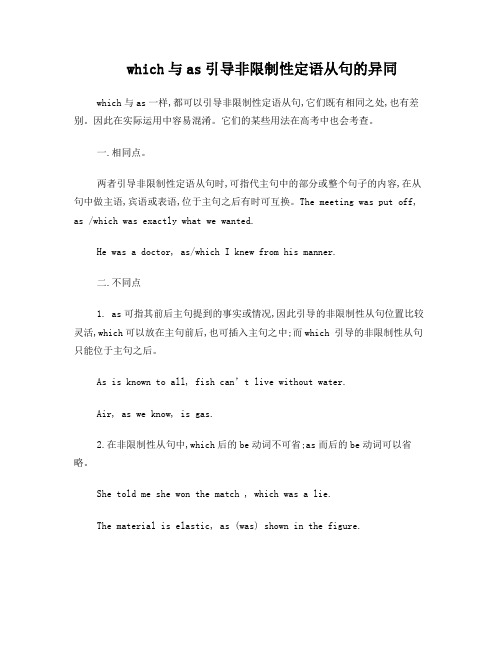
which与as引导非限制性定语从句的异同which与as一样,都可以引导非限制性定语从句,它们既有相同之处,也有差别。
因此在实际运用中容易混淆。
它们的某些用法在高考中也会考查。
一.相同点。
两者引导非限制性定语从句时,可指代主句中的部分或整个句子的内容,在从句中做主语,宾语或表语,位于主句之后有时可互换。
The meeting was put off, as /which was exactly what we wanted.He was a doctor, as/which I knew from his manner.二.不同点1. as可指其前后主句提到的事实或情况,因此引导的非限制性从句位置比较灵活,which可以放在主句前后,也可插入主句之中;而which 引导的非限制性从句只能位于主句之后。
As is known to all, fish can’t live without water.Air, as we know, is gas.2.在非限制性从句中,which后的be动词不可省;as而后的be动词可以省略。
She told me she won the match , which was a lie.The material is elastic, as (was) shown in the figure.3. which在非限制性定语从句做主语时可用各类动词做谓语;而在非限制性定语从句做主语时,谓语常用连系动词,如be, seem, become 等,一般不用其他行为动词。
He saw the girl, which delighted him.He didn’t say anything at the m eeting , as/which seemed very strange. 4. 如果主句中叙述的事情与从句所涉及的意向一致,多用as,用以对主句的意义进行补充;如果不一致,就用whichShe has married again, as was expected.He broke the rules again, which was unexpected.5.如表示“如同。
As 和 Which 引导的非限制性定语从句的区别
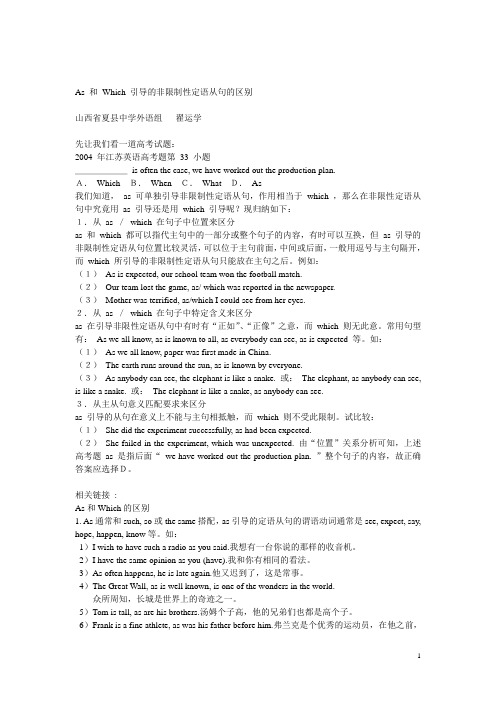
As 和Which 引导的非限制性定语从句的区别山西省夏县中学外语组翟运学先让我们看一道高考试题:2004 年江苏英语高考题第33 小题______is often the case, we have worked out the production plan.A.Which B.When C.What D.As我们知道,as 可单独引导非限制性定语从句,作用相当于which ,那么在非限性定语从句中究竟用as 引导还是用which 引导呢?现归纳如下:1.从as /which 在句子中位置来区分as 和which 都可以指代主句中的一部分或整个句子的内容,有时可以互换,但as 引导的非限制性定语从句位置比较灵活,可以位于主句前面,中间或后面,一般用逗号与主句隔开,而which 所引导的非限制性定语从句只能放在主句之后。
例如:(1)As is expected, our school team won the football match.(2)Our team lost the game, as/ which was reported in the newspaper.(3)Mother was terrified, as/which I could see from her eyes.2.从as /which 在句子中特定含义来区分as 在引导非限性定语从句中有时有“正如”、“正像”之意,而which 则无此意。
常用句型有:As we all know, as is known to all, as everybody can see, as is expected 等。
如:(1)As we all know, paper was first made in China.(2)The earth runs around the sun, as is known by everyone.(3)As anybody can see, the elephant is like a snake. 或:The elephant, as anybody can see, is like a snake. 或:The elephant is like a snake, as anybody can see.3.从主从句意义匹配要求来区分as 引导的从句在意义上不能与主句相抵触,而which 则不受此限制。
非限制性定语从句which和as的用法汇总一篇

非限制性定语从句which和as的用法汇总一篇非限制性定语从句which和as的用法 1非限制性定语从句which和as的用法一、相同之处当从句位于主句之后,引导词指代整个主句所表达的全部意义时,as 和which可以互换。
如:The elephant is like a snake,as/which everybody can see.大家都看得出,这头大象像条蛇。
A big earthquake occurred there last night,as/which was reported on TV.据电视报道,昨夜那里发生了大地震。
She is from Shanghai,as/which I know from her accent.她来自上海,那是我从她的口音知道的。
二、不同之处1、as引导非限制性定语从句时,位置比较灵活,可位于主句之前,也可位于主句之中或之后;而which引导非限制定语从句只能位于主句之后,不能位于主句之前。
如:_______ is known to everybody,the moon travels round the earth.A.ItB.AsC.ThatD.Which答案:B_______ is mentioned above,the number of the students in senior highschools is increasing.A.WhichB.AsC.ThatD.It答案:BAir,as we know,is a gas.众所周知,空气是一种气体。
He is very careful,as his work shows.他的工作表现表明他非常谨慎。
as引导非限制性定语从句常有“如同.那样”的含义,因此在一些固定结构中,如:as we know;as is known to all(众所周知)as we all can see(正如我们大家都能看到的那样)as has been said before/above(正如前面所述)as might be imagined(可以想象得到)as might be expected(正如所预料的那样)as is often the case(情况通常是这样)以上种种固定搭配,一般不能用which代替as。
as和which引导定语从句的区别

as和which引导定语从句的区别as和which引导定语从句的区别导语:As 和which都可以引导非限定性定语从句,在用法上有一些区别。
欢迎阅读!1.as 和which都可以在定语从句中作主语,宾语,既可修饰一个词也可修饰前面的整个句子。
A.She accepted his proposal, as(which)was natural.她接受了她的求婚,这是自然而然的。
B.The boy is pretty handsome, as(which)we can see in our classroom.这个男孩非常的帅气,正如我们在教室看到。
2.as 在非限定性定语从句中的使用2.1 as可以放在主句之前,主句之后,也可以放在句中,可以说位置很灵活。
但是which常用在主句之后A.As we know,technology just like a engine to push the development of economics.众所周知,技术就像是引擎推动着经济的'发展。
B.The diva,as you know, is famous throughoutthe world.这个女歌剧演唱家,正如你知道的,在全世界都出名。
C.He has stood her up, which I don`t believe.他没有赴约,这事我不相信。
2.2 as与the same,such 连用时,用as。
A.This is the same phone as I have borrowed from my sister.这个手机和我向我姐姐借的一样。
B.I have never had such a chance to make a speech as I always imagined.我从没有这样一个机会去演讲,正如我一直想象的那样。
2.3在从句中谓语动词为被动语态,缺少主语时用as,不用which。
as_which引导定语从句的区别

众所周知,which与as都可以引导定语从句,但它们有许多用法上的区别,现就此简要分析如下:一、which与as引导非限制性定语从句的区别:1.Which只能放在主句后面,而as引导的从句位置相对较灵活,可在前,可在中,也可在后。
例如:A) As he realized, I was very useful to him.(在前)B) Air, as we know, is a gas.(在中)C) He was a foreigner,as I know from his accent.(在后)2.在which引导的定语从句中,谓语动词若是am, is, are则这些系动词不能省略;而as后面若是这种情况,则可以省略。
例如:A) He is a teacher, as (is) clear from his manner.(is可以省略)B) He said he had never seen her before, which was not true.(was 不可省略)3.当which引导的从句在意义上近乎并列关系时,可以用and this,and that 代替,意思是“这件事”例如:A) He changed his mind, which(and this, and that)made me very angry.他改变了主意,这使我很生气。
B) She has married again, which(=and this, and that)was unexpected.出乎意料的是,她又结婚了。
而as主要起与上下文连接的作用,表达说话人的看法、观点,并指出主句内容的出处或根据等,例如:C)Einstein, as we know, is a famous scientist.爱因斯坦,众所周知,是位伟大的科学家。
D)As is announced in today’s newspaper, we must improve our style of work.今天的报纸上说,我们必须改进工作作风。
as和which引导非限制性定语从句的区别

as 和which引导非限制性定语从句的区别1,as引导的非限制性定语从句,位置灵活,可以置于主句的句首、句中或句末;先行词不可是一个词,必须是整个主句或主句的部分内容;有“正如、像”等意思,表依据、评论(、态度、看法)等;如:This elephant is like a snake,as anybody can see.像任何人都能看见那样,这头象像条蛇。
He failed in the exam, as we had expected.Tom has passed the test, as everybody knows. 正如每个人所了解的那样,汤姆通过了考试。
【比较:Bamboo is hollow,which makes it very light.竹子是空的,这就使得它很轻。
】常用以下谓语动词的主、被动语态:know, see, say, expect, imagine, hope, believe, announce, suggest, report, point out…, 例:主动(做宾):as we all know, as you know, as everybody knows; as you see, as we can see, as we have seen, as anybody can see; as was expected; as we can imagine, as we have imagined…As we all know, the earth is round.He was a foreigner, as I know from his accent.Mike, as we expected, attended the meeting.像我们所期望的那样,迈克参加了会议。
被动(做主):as is known to everybody, as is known to all; as has been expected; as is often the case (with …),as has been pointed out, as is usual with, as is reported in the newspaper…He is an honest man, as is known to all.As is often the case with young people, he was overconfident.He wasn't unconscious,as could be judged from his eyes.他并未失去知觉,这从他的眼神可以判断出来。
英语as与which引导非限制性定语从句之区别

英语as与which引导非限制性定语从句之区别:练习题。
这类定语从句只能由which或as引导。
两者之间的区别在于:1. which引导的定语从句只能位于主句后,但as引导的从句可位于主句前、中、后。
如:David, as you know, is a photograopher. (不可用which)Li Ming is late, as is often the case. (不可用which)2. as在定语从句中作主语时,从句谓语通常要有be或别的系动词,但which不受此限制。
如:Li Ming was late, which (=and this) made Mr. Zhang very angry. (不可用as)3. as引导的定语从句只表示一个众所周知或意料之中的事,但which不受此限制。
如:He married her, which was unexpected. 他和她结婚了,这是出乎意料的。
(不可用as)4. as有“正如”之意,而which则意为“这(件事,一点)”,可用and this/that/it来代替。
5. as多用于固定搭配中:as is often the case(这是常有的事),as was expected(不出所料),as often happens(正如经常发生的那样),as is known to all(众所周知),as has been said before(如上所述),as is mentioned above(正如上面所提到的)等。
注:which代表整个句子,还可用于in which case, at which point, on which occasion 等。
如:I may have to work late, in which case I’ll telephone you.As的高考知识点归纳1.as做关系代词,引导非限制性定语从句2.as引导非限制性定语从句时,指代逗号前的整个句子(即先行词),常翻译为“正如,正像”,可置于句首或句末。
which与as引导定语从句的区别 之谈
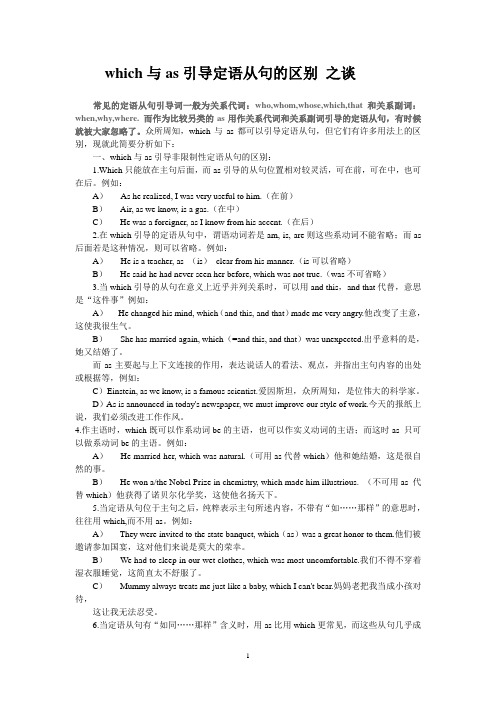
which与as引导定语从句的区别之谈常见的定语从句引导词一般为关系代词:who,whom,whose,which,that 和关系副词:when,why,where. 而作为比较另类的as用作关系代词和关系副词引导的定语从句,有时候就被大家忽略了。
众所周知,which与as都可以引导定语从句,但它们有许多用法上的区别,现就此简要分析如下:一、which与as引导非限制性定语从句的区别:1.Which只能放在主句后面,而as引导的从句位置相对较灵活,可在前,可在中,也可在后。
例如:A)As he realized, I was very useful to him.(在前)B)Air, as we know, is a gas.(在中)C)He was a foreigner, as I know from his accent.(在后)2.在which引导的定语从句中,谓语动词若是am, is, are则这些系动词不能省略;而as 后面若是这种情况,则可以省略。
例如:A)He is a teacher, as (is)clear from his manner.(is可以省略)B)He said he had never seen her before, which was not true.(was不可省略)3.当which引导的从句在意义上近乎并列关系时,可以用and this,and that代替,意思是“这件事”例如:A)He changed his mind, which(and this, and that)made me very angry.他改变了主意,这使我很生气。
B)She has married again, which(=and this, and that)was unexpected.出乎意料的是,她又结婚了。
而as主要起与上下文连接的作用,表达说话人的看法、观点,并指出主句内容的出处或根据等,例如:C)Einstein, as we know, is a famous scientist.爱因斯坦,众所周知,是位伟大的科学家。
北师大版高中英语必修3 Unit8_as与which引导非限制性定语从句的区别
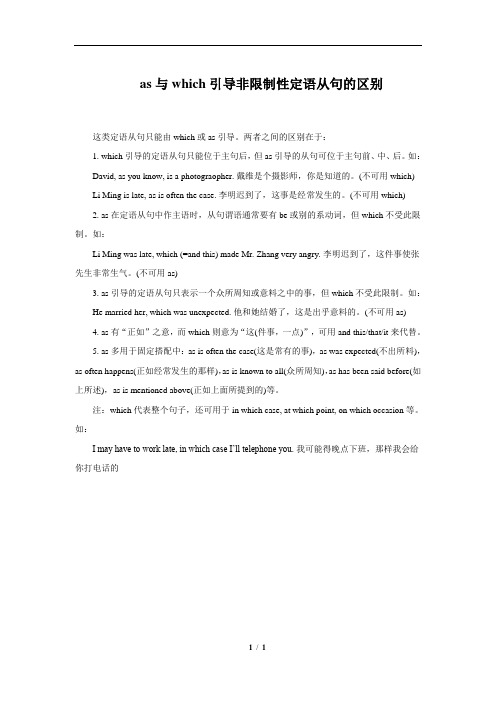
as与which引导非限制性定语从句的区别这类定语从句只能由 which 或 as 引导。
两者之间的区别在于:1. which 引导的定语从句只能位于主句后,但as引导的从句可位于主句前、中、后。
如:David, as you know, is a photograopher. 戴维是个摄影师,你是知道的。
(不可用which) Li Ming is late, as is often the case. 李明迟到了,这事是经常发生的。
(不可用which)2. as在定语从句中作主语时,从句谓语通常要有be或别的系动词,但which不受此限制。
如:Li Ming was late, which (=and this) made Mr. Zhang very angry. 李明迟到了,这件事使张先生非常生气。
(不可用as)3. as 引导的定语从句只表示一个众所周知或意料之中的事,但 which 不受此限制。
如:He married her, which was unexpected. 他和她结婚了,这是出乎意料的。
(不可用as)4. as有“正如”之意,而which则意为“这(件事,一点)”,可用and this/that/it来代替。
5. as多用于固定搭配中:as is often the case(这是常有的事),as was expected(不出所料),as often happens(正如经常发生的那样),as is known to all(众所周知),as has been said before(如上所述),as is mentioned above(正如上面所提到的)等。
注:which 代表整个句子,还可用于in which case, at which point, on which occasion等。
如:I may have to work late, in which case I’ll telephone you.我可能得晚点下班,那样我会给你打电话的1/ 1。
as与which引导非限制性定语从句的区别
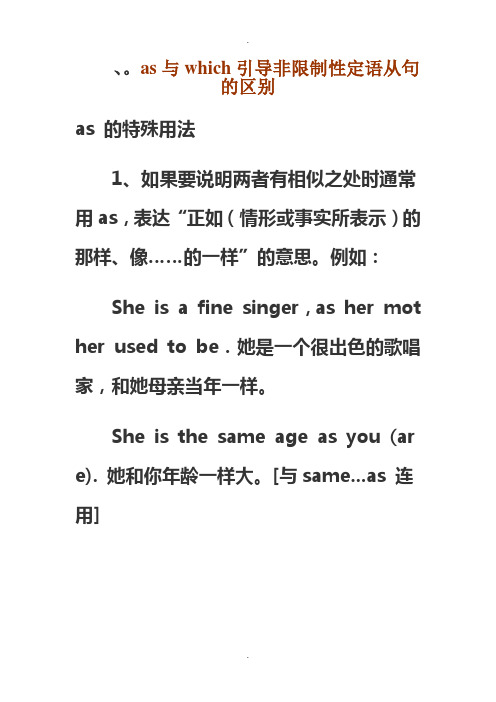
、。
as与which引导非限制性定语从句的区别as 的特殊用法1、如果要说明两者有相似之处时通常用as,表达“正如(情形或事实所表示)的那样、像……的一样”的意思。
例如:She is a fine singer,as her mot her used to be.她是一个很出色的歌唱家,和她母亲当年一样。
She is the same age as you (ar e). 她和你年龄一样大。
[与same...as 连用]I hope to get such a dictionary as he is using. 我希望有一本和你正在用的一样的词典。
[与such...as连用]As water is to fish, so air is to man. 正如水对鱼一样重要,空气对于人同样重要。
She has married again,as was/ seemed natural.她又结婚了,这很自然。
2、as常与从句中的know,see,h ear,expect等动词连用,也常用于as of ten happens,as is often the case(常有的事)等句子中。
As you know, he is from Beijin g. 正如你所知道的,他来自北京。
As is known to everybody,the moon travels round the earth once every month.He was absent,as is often the ca seAs you will find out, all is now set tled. 你将会看到这样的情况,一切都已搞定了。
3、as引导的非限制性定语从句的位置比较灵活,既可位于所修饰的句子之后,也可位于句中或句首;而由which引导的非限制性定语从句一般不位于句首。
例如:As you will find out,I will neve r let you down.你将会发现,我绝不会使你失望的。
as与which引导非限制性定语从句的区别
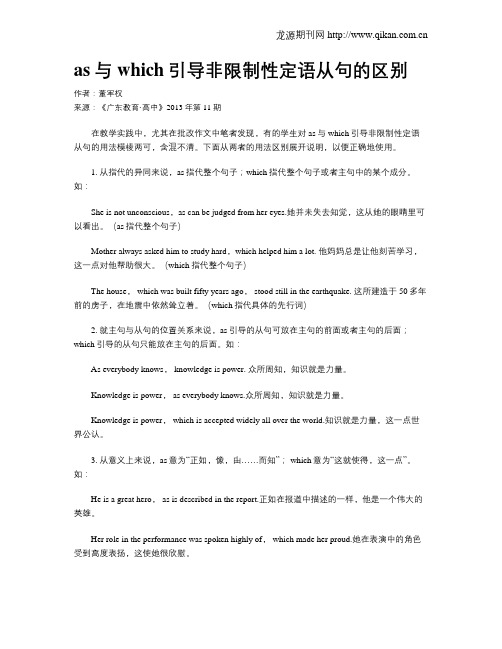
as与which引导非限制性定语从句的区别作者:董军权来源:《广东教育·高中》2013年第11期在教学实践中,尤其在批改作文中笔者发现,有的学生对as与which引导非限制性定语从句的用法模棱两可,含混不清。
下面从两者的用法区别展开说明,以便正确地使用。
1. 从指代的异同来说,as指代整个句子;which指代整个句子或者主句中的某个成分。
如:She is not unconscious,as can be judged from her eyes.她并未失去知觉,这从她的眼睛里可以看出。
(as指代整个句子)Mother always asked him to study hard,which helped him a lot. 他妈妈总是让他刻苦学习,这一点对他帮助很大。
(which指代整个句子)The house, which was built fifty years ago, stood still in the earthquake. 这所建造于50多年前的房子,在地震中依然耸立着。
(which指代具体的先行词)2. 就主句与从句的位置关系来说,as引导的从句可放在主句的前面或者主句的后面;which引导的从句只能放在主句的后面。
如:As everybody knows, knowledge is power. 众所周知,知识就是力量。
Knowledge is power, as everybody knows.众所周知,知识就是力量。
Knowledge is power, which is accepted widely all over the world.知识就是力量,这一点世界公认。
3. 从意义上来说,as意为“正如,像,由……而知”; which意为“这就使得,这一点”。
如:He is a great hero, as is described in the report.正如在报道中描述的一样,他是一个伟大的英雄。
As和which在引导定语从句时的区别
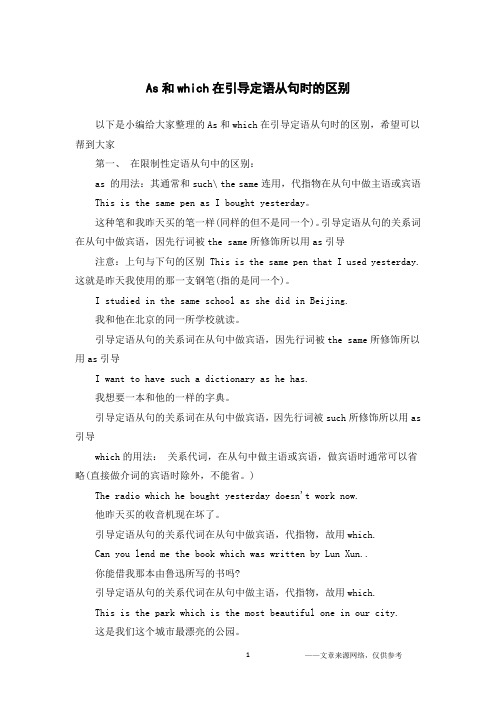
As和which在引导定语从句时的区别以下是小编给大家整理的As和which在引导定语从句时的区别,希望可以帮到大家第一、在限制性定语从句中的区别:as 的用法:其通常和such\ the same连用,代指物在从句中做主语或宾语This is the same pen as I bought yesterday。
这种笔和我昨天买的笔一样(同样的但不是同一个)。
引导定语从句的关系词在从句中做宾语,因先行词被the same所修饰所以用as引导注意:上句与下句的区别 This is the same pen that I used yesterday.这就是昨天我使用的那一支钢笔(指的是同一个)。
I studied in the same school as she did in Beijing.我和他在北京的同一所学校就读。
引导定语从句的关系词在从句中做宾语,因先行词被the same所修饰所以用as引导I want to have such a dictionary as he has.我想要一本和他的一样的字典。
引导定语从句的关系词在从句中做宾语,因先行词被such所修饰所以用as 引导which的用法:关系代词,在从句中做主语或宾语,做宾语时通常可以省略(直接做介词的宾语时除外,不能省。
)The radio which he bought yesterday doesn't work now.他昨天买的收音机现在坏了。
引导定语从句的关系代词在从句中做宾语,代指物,故用which.Can you lend me the book which was written by Lun Xun..你能借我那本由鲁迅所写的书吗?引导定语从句的关系代词在从句中做主语,代指物,故用which.This is the park which is the most beautiful one in our city.这是我们这个城市最漂亮的公园。
as和which引导的定语从句的区别

从山东一道高考题看as和which引导的定语从句区别as 引导的定语从句可以代替整个主句内容;which引导的定语从句可以代替整个主句,有时代替主句部分内容。
那么它们有什么区别呢?1)意义上的区别(此点是关键区别)as 往往翻译为“正如”;which往往翻译为“这一点”。
Mr. Lu committed suicide, which made the whole nation sad.He passed all the examinations, as we had expected.As 往往有一些相对固定的形式as we had expected, as we all know, as is known to us all, as is/was reported, as is often the case, as it turned out, as we can remember etc.He was late for work this morning, as is often the case.2) 位置上的区别which引导的定语从句,常常位于句末,有时位于句中,一般不能位于句首;as 引导的定语从句可以位于句首,句中,句末。
She married John, which surprised us all.Whenever I met her, _________ was fairly often, she greeted me with a sweet smile.(09山东)A. whoB. whichC. whenD. thatAs we all know, the sun rises in the east and sets in the west.The sun rises in the east and sets in the west, as we all know.The sun, as we all know, rises in the east and sets in the west.小提示:Which 引导的定语从句,位于句首的情况,本人在英美人写的文章中看到过好几次。
which与as引导非限制性定语从句的异同
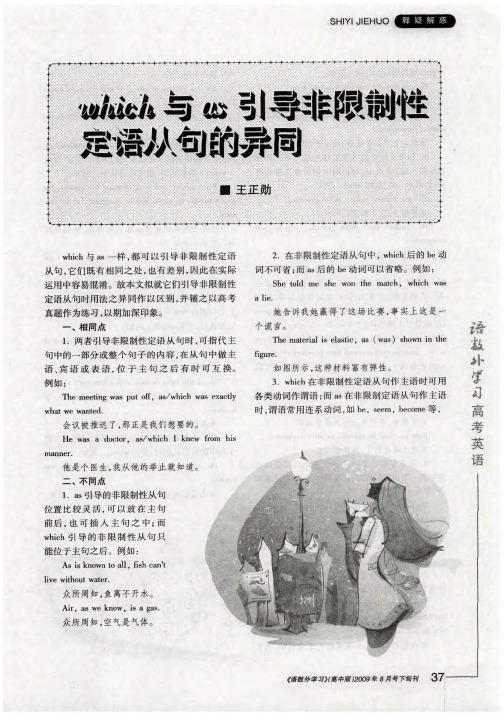
n
+
抽象 名 词 构成定 语 从 句
a r s o
”
。
例如 :
r
充 ;如 果 不
She go
致 就用
,
w
。
例如 :
w e e x
ye
f ha rd
c o u
w o r
k
c
ha
n
g e d he
gre
a
t ly
a
,
fo r
r s
t
m
a rr
ie d
a
ga in
a s
pe
c
te
d
.
w
hic h
ig ht
,
的结 构 有
a s
w e
kn
o w
( 众所 周 知 )
,
,
a s
o
he
n
ha p p e
n s
主 句 中 谓 语 的整 个 概 念 从 句 中 的 谓 语 动 词 是 否
( 正 如 常 发 生 的那 样 )
a s
is
o
t f
e n
the
e a s e
( 情况常
,
定形式时 常用
,
w
h ic h
a
。
例如 :
le
a
常如 此 )
is
s a
,
a s
w e
a
ll
c a n
s e e
( 正 如我们看 到 的 )
o w n
a s
He
c a n n o
c a n
w r
as_which引导定语从句的区别

众所周知,which与as都可以引导定语从句,但它们有许多用法上的区别,现就此简要分析如下:一、which与as引导非限制性定语从句的区别:1.Which只能放在主句后面,而as引导的从句位置相对较灵活,可在前,可在中,也可在后。
例如:A) As he realized, I was very useful to him.(在前)B) Air, as we know, is a gas.(在中)C) He was a foreigner,as I know from his accent.(在后)2.在which引导的定语从句中,谓语动词若是am, is, are则这些系动词不能省略;而as后面若是这种情况,则可以省略。
例如:A) He is a teacher, as (is) clear from his manner.(is可以省略)B) He said he had never seen her before, which was not true.(was 不可省略)3.当which引导的从句在意义上近乎并列关系时,可以用and this,and that 代替,意思是“这件事”例如:A) He changed his mind, which(and this, and that)made me very angry.他改变了主意,这使我很生气。
B) She has married again, which(=and this, and that)was unexpected.出乎意料的是,她又结婚了。
而as主要起与上下文连接的作用,表达说话人的看法、观点,并指出主句内容的出处或根据等,例如:C)Einstein, as we know, is a famous scientist.爱因斯坦,众所周知,是位伟大的科学家。
D)As is announced in today’s newspaper, we must improve our style of work.今天的报纸上说,我们必须改进工作作风。
as which 的区别

1、as与which的用法区别:(1)引导限制性定语从句时,在such,as,thesame后只能用as,其他情况用which:如:I never heard such stories as he tells. 我从未听过他讲那样的故事。
It's the same story as I heard yesterday. 这故事跟我昨天听到的一样。
This is the photo which shows my house. 这张照片拍的是我的住宅。
(2)引导非限制性定语从句时,有时两者可互换:如:I live a long way from work, as [which] you know. 我住得离工作单位很远,这你是知道的。
(3)但在,在以下情况引导非限制性定语从句时,两者不可换用:①当从句位于主句前面时,只用as:如:As is known to everybody, the moon travels round the earth once every month. 月球每月绕地球转一周,这是每个人都清楚的。
②as引导的非限制性定语从句应与主句在意义上和谐一致,which无此限制:如:He went abroad, as[which] was expected. 他出国了,这是大家预料到的。
He went abroad, which was unexpected. 他出国了,这让大家感到很意外。
(不用as)③as引导非限制性定语从句时,先行词通常不能是主句中某个具体的词,而应是整个句子、整个短语或某个短语推断出来的概念,而which则无此限制:如:The river, which flows through London, is called the Thames. 这条流经伦敦的河叫泰晤士河。
(不用as)④当as引导非限制性定语从句作主语时,其谓语通常应是连系动词,而不宜是其他动词,而which则无此限制:如:She has married again, as[which] seemed natural. 她又结婚了,这似乎很自常。
as和which的用法区别
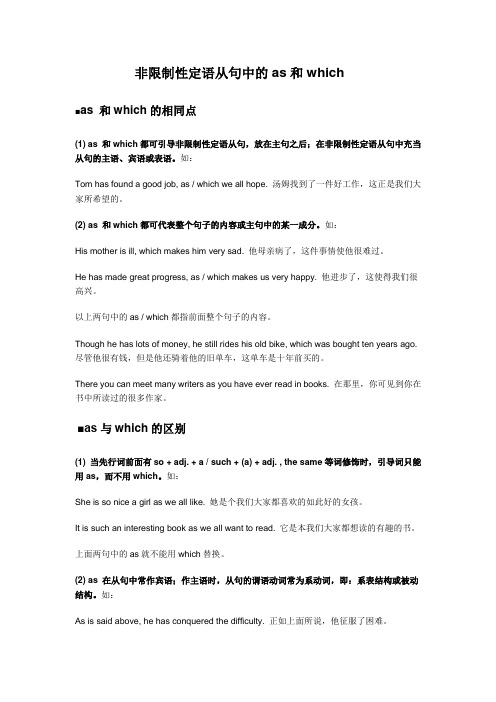
非限制性定语从句中的as和which■as 和which的相同点(1) as 和which都可引导非限制性定语从句,放在主句之后;在非限制性定语从句中充当从句的主语、宾语或表语。
如:Tom has found a good job, as / which we all hope. 汤姆找到了一件好工作,这正是我们大家所希望的。
(2) as 和which都可代表整个句子的内容或主句中的某一成分。
如:His mother is ill, which makes him very sad. 他母亲病了,这件事情使他很难过。
He has made great progress, as / which makes us very happy. 他进步了,这使得我们很高兴。
以上两句中的as / which都指前面整个句子的内容。
Though he has lots of money, he still rides his old bike, which was bought ten years ago. 尽管他很有钱,但是他还骑着他的旧单车,这单车是十年前买的。
There you can meet many writers as you have ever read in books. 在那里,你可见到你在书中所读过的很多作家。
■as与which的区别(1) 当先行词前面有so + adj. + a / such + (a) + adj. , the same等词修饰时,引导词只能用as,而不用which。
如:She is so nice a girl as we all like. 她是个我们大家都喜欢的如此好的女孩。
It is such an interesting book as we all want to read. 它是本我们大家都想读的有趣的书。
上面两句中的as就不能用which替换。
(2) as 在从句中常作宾语;作主语时,从句的谓语动词常为系动词,即:系表结构或被动结构。
- 1、下载文档前请自行甄别文档内容的完整性,平台不提供额外的编辑、内容补充、找答案等附加服务。
- 2、"仅部分预览"的文档,不可在线预览部分如存在完整性等问题,可反馈申请退款(可完整预览的文档不适用该条件!)。
- 3、如文档侵犯您的权益,请联系客服反馈,我们会尽快为您处理(人工客服工作时间:9:00-18:30)。
As与which引导非限定性定语从句辨析
1.as引导非限制性定语从句,只代表主语或主句的一部分所表达的意思(不能指代某个名词或代词),可以放在主句前,后或中间,在从句中作主语或宾语、例如:
As is known to all, he is the best student in our class. (as指代整个句子,作主语,置于句首)
He opposed the idea, as could be expected. (as 指代整个句子,作主语,置于句末)
As we all know, he studies very hard. (as 指代整个句子,作宾语,置于句首) Taiwan is, as you know, an inseparable part of China. (as指代整个句子,作宾语,置于句中)
2.在非限制性定语从句中,which和as引导定语从句时的区别:
a. which引导的从句不能放在主句前,而as引导的从句则既可以放在主句前,也可以放在主句后。
例如:
As (正确) is often the case, he is absent.
Which (错误)
He saw the girl, as (正确) He had hoped.
Which (正确)
b.用能做关系代词,as和which都可以指代一个句子,但as有“正如”、“就像”之意,which则没有此含义。
He is a foreigner, as I know from his accent. (as指代一个句子,意为“正如”、“就像”)
He has to work on Sunday, which he doesn’t like. (which指代一个句子,没有“正如”、“就像”)
c.当从句的谓语动词是be或相当于联系动词的seem, become等时,可用as或which作主语。
但当从句的谓语是行为动词时,只能用which作主语。
例如:
He married her, as (正确) was / seemed natural.
Which (正确)
He saw the girl, as (错误) delighted him.
Which (正确。
